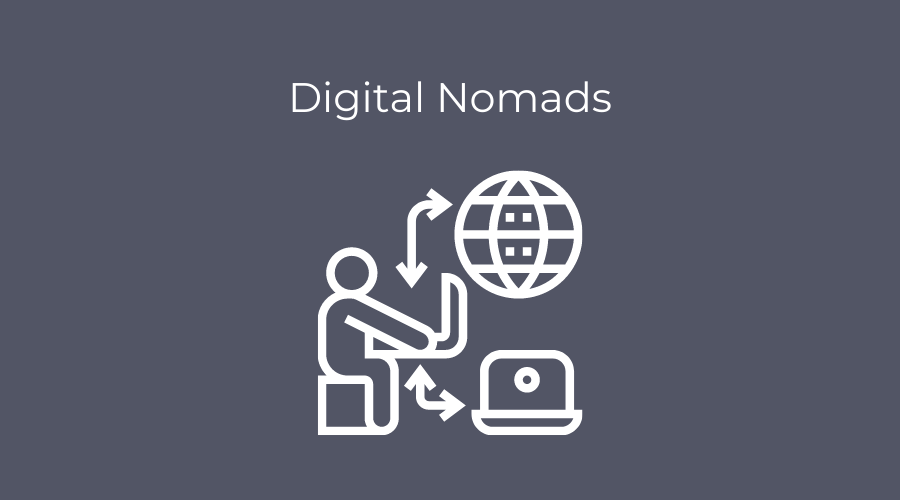There’s a new class of workers who travel the world while working remotely. They are the digital nomads who discovered during the Covid shutdown they could just as easily work from a hostel, a campground or an RV as from an office.
What makes these digital nomads different is that they are full-time employees with traditional jobs. Once mostly composed of freelancers, contract workers, and the self-employed, the nearly 11 million digital nomads now include millions of traditional job holders. Doubling in just one year, there’s now more than 6 million of them working almost anywhere they please.
As a study by MBO Partners explains, “The COVID-19 pandemic resulted in major changes in the make-up of digital nomads. The biggest shift is that traditional job holders have been unleashed from their offices and many, instead of staying in one place, are taking to the road. In 2020, the number of traditional workers working as digital nomads grew 96 percent, from 3.2 million to 6.3 million.”
The pandemic also increased the number of independent workers opting for the digital nomad lifestyle, but by a much smaller 12%, to 4.6 million.
The pandemic prompted other changes in the ranks of digital nomads. Boomers, who previously accounted for 27% of the cohort, now make up 17%. GenXers declined by 3 points to 22%. The researchers say the decline in these two groups is due largely to Covid’s health risks “making them temporarily less interested in a nomadic lifestyle and more comfortable staying at home.”
On the other hand younger workers jumped at the chance to work and travel domestically and abroad. Their share grew from 48% to 62%.
By far more men than women are digital nomads. The split is 59% to 41%. The racial makeup, however, mirrors the U.S. population: 70% white, 14% African American, 7% Hispanic, 7% Asian, and 2% other. The study also found these workers to be far more technically savvy, better educated and they participate much more in work-related skills training than their stay at home counterparts.
They’re also very satisfied (81%) or satisfied (9%) with their lifestyle.
The same can’t be said for their employers, most of whom have no policies or programs and may not even know just how remote their remote workers are.
When the pandemic forced companies to go virtual, like most other employers Morgan Stanley was expecting its employees to work from home.
Most did. But a small, yet significant number discovered that remote could be anywhere in the world there’s internet access and cell service. So many became digital nomads that in June CEO James Gorman bluntly declared the company office was the place to be.
“If you want to get paid New York rates, you work in New York. None of this ‘I’m in Colorado and working in New York and getting paid like I’m in New York.’ Sorry, that doesn’t work.”
This geoarbitrage – workers from high-wage areas traveling to low-cost areas – isn’t the only issue rankling employers. There are legal concerns over labor laws and tax rules that vary from state to state and, even more significantly from country to country.
Littler, the global employment law firm, saw the trend toward cross-border telecommuting as important enough to publish a special report. What to do about “Global COVID Nomads discusses the legal issues and compliance risks employers face when their employee travel outside the area.
Covid Nomads
“Domestic covid nomads cause compliance issues when they get away and start working in some new state, province or municipality,” notes the report. “But a global covid nomad, by definition, triggers international legal challenges. These challenges can be particularly tough to rectify, even hard to spot.”
Individual workers too have to be aware of differing tax laws, not to mention visa and residency requirements. Global nomads may be on the hook for paying income tax in both the US and the country where they work. The situation is less complicated for domestic nomads, but they still need to understand multi-state tax rules.
Travel websites and remote work job boards have sprung, if not to the rescue, at least to offer help.
TravelingLifestyle, for example, has an entire section focused just on digital nomading, listing countries with tax incentives and other programs to lure digital nomads. Other sites have lists of jobs especially suited to the digital nomad lifestyle.
Will the digital nomad trend survive the end of the pandemic and employers’ return to the office hopes?
Without question agree employment professionals. Writes Dan Schawbel, author and managing partner of Workplace Intelligence, “Digital nomads will continue to roam the world post-Covid and companies that want to attract and retain them will enable their lifestyle in exchange for their highly-skilled talent, productivity.”
Coincidentally enough, among the tech and creative jobs FlexJobs lists for digital nomads, one type in particular stands out – recruiter.
John Zappe Contributed


